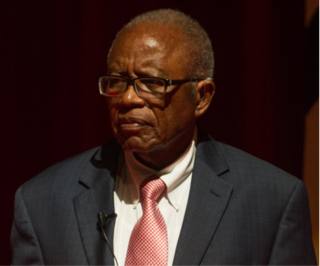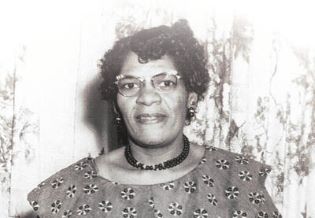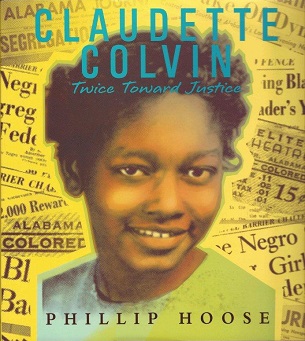Related Research Articles

Rosa Louise McCauley Parks was an American activist in the civil rights movement best known for her pivotal role in the Montgomery bus boycott. The United States Congress has honored her as "the first lady of civil rights" and "the mother of the freedom movement".

Claudette Colvin is an American pioneer of the 1950s civil rights movement and retired nurse aide. On March 2, 1955, she was arrested at the age of 15 in Montgomery, Alabama, for refusing to give up her seat to a white woman on a crowded, segregated bus. This occurred nine months before the more widely known incident in which Rosa Parks, secretary of the local chapter of the National Association for the Advancement of Colored People (NAACP), helped spark the 1955 Montgomery bus boycott.
Mary Louise Ware is an African-American civil rights activist. She was arrested in October 1955 at the age of 18 in Montgomery, Alabama for refusing to give up her seat on the segregated bus system. She is one of several women who were arrested for this offense prior to Rosa Parks that year. Parks was the figure around whom the Montgomery bus boycott was organized, starting December 5, 1955.

The Montgomery bus boycott was a political and social protest campaign against the policy of racial segregation on the public transit system of Montgomery, Alabama. It was a foundational event in the civil rights movement in the United States. The campaign lasted from December 5, 1955—the Monday after Rosa Parks, an African-American woman, was arrested for her refusal to surrender her seat to a white person—to December 20, 1956, when the federal ruling Browder v. Gayle took effect, and led to a United States Supreme Court decision that declared the Alabama and Montgomery laws that segregated buses were unconstitutional.

Edgar Daniel Nixon, known as E. D. Nixon, was an American civil rights leader and union organizer in Alabama who played a crucial role in organizing the landmark Montgomery bus boycott there in 1955. The boycott highlighted the issues of segregation in the South, was upheld for more than a year by black residents, and nearly brought the city-owned bus system to bankruptcy. It ended in December 1956, after the United States Supreme Court ruled in the related case, Browder v. Gayle (1956), that the local and state laws were unconstitutional, and ordered the state to end bus segregation.
Browder v. Gayle, 142 F. Supp. 707 (1956), was a case heard before a three-judge panel of the United States District Court for the Middle District of Alabama on Montgomery and Alabama state bus segregation laws. The panel consisted of Middle District of Alabama Judge Frank Minis Johnson, Northern District of Alabama Judge Seybourn Harris Lynne, and Fifth Circuit Court of Appeals Judge Richard Rives. The main plaintiffs in the case were Aurelia Browder, Claudette Colvin, Susie McDonald, and Mary Louise Smith. Jeanetta Reese had originally been a plaintiff in the case, but intimidation by segregationists caused her to withdraw in February. She falsely claimed she had not agreed to the lawsuit, which led to an unsuccessful attempt to disbar Fred Gray for supposedly improperly representing her.

Fred David Gray is an American civil rights attorney, preacher, and activist from Alabama. He litigated several major civil rights cases in Alabama, including some, such as Browder v. Gayle, that reached the United States Supreme Court. He served as the president of the National Bar Association in 1985, and in 2001 was elected as the first African-American President of the Alabama State Bar.
The Women's Political Council (WPC), founded in Montgomery, Alabama, was an organization that formed in 1946 that was an early force active in the civil rights movement that was formed to address the racial issues in the city. Members included Mary Fair Burks, Jo Ann Robinson, Irene West, Thelma Glass, and Uretta Adair.

Johnnie Rebecca Daniels Carr was a leader in the Civil Rights Movement in the United States from 1955 until her death.

Aurelia Shines Browder Coleman was an African-American civil rights activist in Montgomery, Alabama. In April 1955, almost eight months before the arrest of Rosa Parks and a month after the arrest of Claudette Colvin, she was arrested for refusing to give up her bus seat to a white rider.

Jeremiah Reeves was a 22-year-old African American, a former jazz drummer, who was unjustly executed by the state of Alabama by electrocution after being convicted of raping a white woman in 1952. At the time of the events, Reeves was 16 years old, working as a grocery delivery boy; at his trial, he denied having had sex with the white woman. His sentence and execution were considered unjust, outsize for the crime, and a large protest had formed by the time he was executed, after appeals.
Phillip M. Hoose is an American writer of books, essays, stories, songs, and articles. His first published works were written for adults but he turned his attention to children and young adults, in part to keep up with his daughters. His work has been well received and honored more than once by the children's literature community. He won the Boston Globe–Horn Book Award, Nonfiction, for The Race to Save the Lord God Bird (2004) and the National Book Award, Young People's Literature, for Claudette Colvin (2009).

On the Bus with Rosa Parks is a book of poems by Rita Dove. Rosa Parks was an American activist in the civil rights movement best known for her pivotal role in the Montgomery bus boycott. The United States Congress has called her "the first lady of civil rights" and "the mother of the freedom movement".

Rosa Parks Day is a holiday in honor of the civil rights leader Rosa Parks, celebrated in the U.S. states of California and Missouri on her birthday, February 4, in Michigan on the first Monday after her birthday, and in Ohio and Oregon on the day she was arrested, December 1.

Claudette Colvin: Twice Toward Justice is a 2009 young adult nonfiction book by Phillip Hoose, recounting the experiences of Claudette Colvin in Montgomery, Alabama, during the Civil Rights Movement.

Montgomery Industrial School for Girls was a private primary school founded by Alice White and H. Margaret Beard in Montgomery, Alabama, in 1886. Their goal was to instill rigorous Christian morals and a vocational education, with academic courses for black girls from kindergarten to eighth grade. According to the Encyclopedia of Alabama, "the school played an important role in shaping the lives of a number of women who would help spark the civil-rights movement in Montgomery, the state of Alabama, and the nation".
Richard Bailey is an American historian. He has written history books about Alabama during the Reconstruction era and its African American leaders. His book Neither Carpetbaggers Nor Scalawags about African American officials in Alabama during the Reconstruction era was selected by the Alabama Board of Education as a supplemental school text, only the second time a book authored by an African American has been so designated in the state. He has also helped organize efforts to erect historical markers at significant sites. He also leads black history tours.
Swayne College, founded as the Swayne School, was a school for African American students in Montgomery, Alabama. Built in 1865 and dedicated in 1869, it was named for General Wager Swayne who led the U.S. Army in Alabama after the American Civil War and later oversaw the Freedmen's Bureau in the state. He helped establish schools for African Americans in Alabama. The school operated from 1868 to 1937
Elijah Cook was a community leader, organizer of schools, and legislator from Montgomery, Alabama. A former slave, he helped establish Montgomery's first school for African Americans in 1865 after the American Civil War. Chose the site for Swayne College in 1868. He also helped bring Lincoln Normal School, predecessor of Alabama State University, to Montgomery from Marion, Alabama. The New York Public Library has a photograph of his home, business, Cook, and his wife from a book published by Chicago publisher Hertel, Jenkins & Co.
Conecuh County Training School was a school for African American students in Evergreen, Alabama. It became Thurgood Marshall High School when it was renamed for Thurgood Marshall who was appointed to the U.S. Supreme Court. It was turned into a middle school in 1970. Its principal O. F. Frazier wrote that he was removed for a white principal and then let go.
References
- ↑ McCaster, Melvin J. (December 3, 2008). Struck Down, but Not Destroyed: Journeys Through Challenges of Faith and Doubt. Xlibris Corporation. ISBN 9781462828388 – via Google Books.
- ↑ Wilkerson, Lyn (January 10, 2010). Slow Travels-Alabama. Lulu.com. ISBN 9780557140558 – via Google Books.
- ↑ Caver, Joseph (October 20, 2020). From Marion to Montgomery: The Early Years of Alabama State University, 1867-1925. NewSouth Books. ISBN 9781588383617 – via Google Books.
- ↑ "Booker T. Washington Magnet High School Has a Long History". 19 August 2018.
- ↑ History, Alabama Department of Archives and (March 6, 1923). "Alabama Official and Statistical Register". Brown Printing Company – via Google Books.
- ↑ House, Thomas A. (March 6, 1955). "A Survey of the Difficulties Experienced by the Student-teachers in the Teaching of History at Alabama State Laboratory High School and Booker T. Washington High School, Montgomery, Ala". Alabama State University – via Google Books.
- ↑ Williams, Irene C. (March 6, 1957). "A Study of the Relationship Between Retardation and Drop-outs in the Seventh, Eighth, and Ninth Grades at the Booker T. Washington High School, Montgomery, Alabama, 1953-55". Alabama State University – via Google Books.
- ↑ Burrow, Rufus (March 6, 2014). Extremist for Love: Martin Luther King Jr., Man of Ideas and Nonviolent Social Action. Augsburg Fortress Publishers. ISBN 9781451470208 – via Google Books.
- ↑ Directors, Site; Trail, Friends of the Civil Heritage (February 6, 2017). Montgomery's Civil Heritage Trail: A History & Guide. Arcadia Publishing. ISBN 9781625858146 – via Google Books.
- ↑ Carter, Clinton; Palmer, Kerry; Stifflemire, Roger (January 1, 2015). 'Echoes' of Robert E. Lee High School: The First Decade, 1955-65. NewSouth Books. ISBN 9781603063807 – via Google Books.
- ↑ Levine, Ellen S. (December 1, 2000). Freedom's Children: Young Civil Rights Activists Tell Their Own Stories. Penguin. ISBN 9781101076170 – via Google Books.
- ↑ "Alabama High School Football History". www.ahsfhs.org. Retrieved 2023-01-08.
- ↑ Theoharis, Jeanne (November 24, 2015). The Rebellious Life of Mrs. Rosa Parks. Beacon Press. ISBN 9780807076934 – via Google Books.